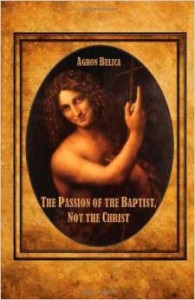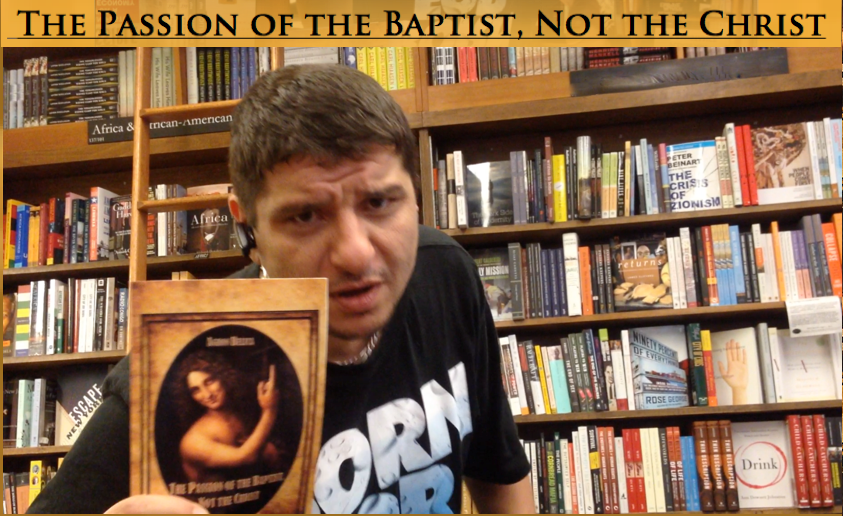The Passion of the Baptist, Not the Christ By Agron Belica

A well written and well thought out alternative to what was at best a problematic and most likely fictitious account of the personalities involved in the crucifixion. Belica’s evidence to support his supposition is very strong, much stronger than can be found in the new testament.
—Professor P. Dreier, Encore Music Academy
In this book, Agron Belica offers a fresh interpretation of the momentous events on a hillock beyond the walls of Jerusalem nearly two millennia ago: the Crucifixion. Belica asks disconcerting questions about the received version of gospel “history” and gives free rein to his inquisitive nature. Many of his ideas and speculations will strike the casual reader schooled in the ancient Biblical Traditions with which they conflict as unhistorical, impossible, and unbelievable. Yet, when questioning established premises, the impossible may often be shown to be possible, as Socrates was fond of doing.
Mr. Belica does not claim to be proving anything, except that with some speculation and reinterpretation of the Biblical record and relevant Quranic texts, when coupled with a few remarks from Josephus, the whole traditional version of the Crucifixion can be seen in a different light. Belica throws new ideas and new possibilities at the reader, asking only that they be considered. Like a barrage of rockets shot into the moonless night sky, some flaring more brightly than the others, some of his speculations are more plausible than others, but all are provocative and worth thinking about. His is the first innovative interpretation of the Crucifixion since Dr. Hugh Schonfield looked at it two generations ago.
Beyond that, Belica has taken upon himself the task of redressing the imbalance between the gospel Jesus and the gospel John the Baptist and, in our opinion, has done so with justice on his side. The gospel writers diminished John in order to exalt Jesus and transform him into a superhuman, divine entity. While their motives are understandable, the researcher who seeks to explore unanswered questions and obscure “competitors” to the demigod they were creating, is understandably frustrated and can only mourn the lost evidence. This is particularly true for John the Baptist. In the New Testament, he is a minor figure, his purpose is to introduce and validate the mission of his kinsman Jesus as the Messiah.
Belica asks why was John the Baptist so used by the gospellers and then dismissed to the limbo of silence, together with the Essenes who, though a considerable presence in the Palestine of the day, are not even mentioned by them? He was intrigued by that question and began to study the references to John, gradually conceiving unprovable, but provocative theories. His work became known to a mutual friend, the author of a number of valuable books and articles on various aspects of Islamica, Dr. Laleh Bakhtiar—who also became interested in John the Baptist, and through her, I was introduced to him. At first, I was rather skeptical, but was persuaded to look into the historical injustice done to John. (He is much better served in the Quran than he is in the Bible.) Having trusted her instincts over the years in such things in my own literary projects, and with her continuous encouragement and suggestions, I set to work. The result of my own inquiry, the monograph Rethinking John the Baptist, is appended to the present volume.
Meanwhile, Agron Belica continued his own research, examining new evidence while elaborating and working out his theories and speculations. The results of this work constitute the main portion of this volume that is dedicated to the rehabilitation of the repute and stature of that much neglected prophet, John the Baptist, known in the Islamic world as Yahya. I was pleased to be chosen as his editor and annotator for this book. - Dr. Jay R. Crook
It is said that history is written by the winners. As one engaged in research and journalism and who keeps that old saw in mind, I am always interested in new ideas and new interpretations of accepted truths. This carefully researched study of one of the most important events in human history certainly answers to both of those interests. The author re-examines the conventional ideas about the relationship between the Baptist and the Christ that most people have accepted for centuries as gospel truth.
He uncovers manifest discrepancies in the biblical narratives that have dominated European and even Muslim thought and, moreover, between them and lesser-known external sources such as the writings of Josephus. The calm logic of his analyses overturn convention and lead inexorably to startling new visions of John and Jesus and even the Passion itself. The Passion of the Baptist, Not the Christ is a well-written and interesting book. It is recommended reading for those interested in redressing the distortions of “history written by the winners.”
—Lisa Spaulding, Journalist
REVIEWS FOR THE PASSION OF THE BAPTIST, NOT THE CHRIST
Born in 1974 of Albanian descent, Agron Belica is a student of comparative religion. He developed a particular interest in the prophet Yahya (John the Baptist) and in 2008, he published his Ihya al-Nabi Yahya, from which the present, more comprehensive study of Yahya has evolved. Belica’s work on some key words in the Quran has been referenced in Dr. Laleh Bakhtiar’s The Concordance of the Sublime Quran, a supplemental study resulting from her translation of the Quran, The Sublime Quran, the first such translation by an American Muslim woman. His research paper on the meaning of those key words has also been cited in The Bible by Wikimedia Foundation.
His work motivated Dr. Jay R. Crook to write the essay Rethinking John the Baptist, included in this volume. Belica has also developed a considerable reputation as a socio-political hip-hop artist. He has already contributed a number of thought-provoking songs to the genre. His Newsic Revolution album featured the noted musician and author Gilad Atzmon. Belica’s songs about human rights have been played on six continents. One of those songs, Leave Those Babies Alone, was featured at the 2013, and 2014 San Francisco Pride Parade, helping to rock 1.2 million people. His eldest son, Jamal Belica, has founded the Aldin Entertainment Music Group.



















 London
London
 Oregon
Oregon





Leave a Reply
You must be logged in to post a comment.